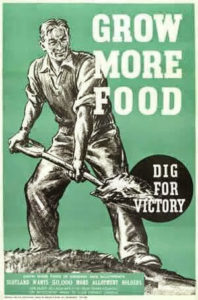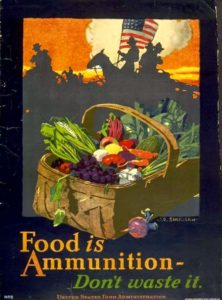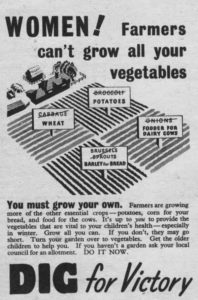Victory Garden
Here is our website about our Victory Garden Program – Click Here.
How did the Victory Garden evolve, and what exactly is it?


Victory gardens are also known throughout our modern war history as “war gardens” or “food gardens for defense”, earning their innocuous names from the eras they were born in: during World War I as a citizen led effort to support the economy, and during World War II, as a government led propaganda campaign for a patriotic people to support the efforts of war. During this time even those in urban city environments began using literally any available planting space, ranging from home areas to public parks and roadside spaces. To not be growing a victory garden during this time was actually considered unpatriotic to many citizens.

Many times, during wartime, the participating countries involved often task its citizens with “war efforts” of many scales and sizes to support the men and women overseas fighting, and not at all the least of those efforts encouraged were family home gardens, called “Victory Gardens”. The victory garden at its most basic level during its golden age was a food garden encouraged to be grown for and by families per request of a countries’ national governments as a way to increase food production for every domestic citizen, as well as to help ease and lessen the burden on the military for the food supply needed for soldiers during wartime. These victory gardens were called for both in place of and in supplement to the traditional family farms, as the governments began rationing much of the food going into and made within the country via factory farms and processing plants.

This garden would have been used to grow any variety of edible plant, from fruit bearing plants and trees, to any ground, vine and root vegetables. In some gardens one could even find herbs for both cooking and medicinal use. The foods grown were often grown within a community plan, a plan that would help decide what was needed and how it was going to be achieved. Doing this through group effort and the ultimate show of community involvement, the victory garden helped lead the way to wartime self-sufficiency through planting, canning, drying, and preparing raw or cooked food in daily meals, with this method thus providing for every family in need without a great weight or cost to the governmental provisions or extra taxation on burgeoning cities and towns.
Why is a modern Victory Garden so important in today’s cultural climates?
Some of the key requirements for human life to succeed and thrive begin with but are not limited to: fresh food security from a source that is available to all, clean water sources available to all, clean air to breath, and not least of all: the ability to form both emotional and physical connections to other human beings. Community gardens of every kind have always managed to bring people together, fostering the invaluable connections humankind both biologically and spiritually need to live happy and secure lives. Learning to grow our own food fosters a love for, connection to, and care for other humankind, the abundance of plants, trees, and fungi, and the land upon which we live, something that seems to missing as a societal normalcy in so many places across the globe, and particularly on home soil.
In this modern day full of new worlds of emerging science and technology, and an ever changing ethical, political, and cultural climate, our fight for food health, availability, and security is no longer limited to just some nostalgically patriotic ideal of supporting a war. Our societal struggles have unavoidably evolved from battles for nations and borders, to battles for our food and water cleanliness, health of our ecosystems on this planet, and the security in our food and our sovereign selves.

What we once termed the “victory gardens” are once again taking root in our societies, by finding their way back into our backyards, into any and all available open growing spaces, and back into the collective of human hearts and minds. Today the planet is riddled with so many ecosystem killers: i.e., GMO’s (genetically modified organisms, also known as genetically engineered foods), chemically laden and toxic food touted to be somehow better for us by gigantic corporations, over-processed and nutrient deficient food, soil toxicity and nutrient depletion, water pollution from big oil, inhumane animal agriculture, unsound and dangerous large farming practices, a globally warming planet due to carbon outputs and cloud seeding practices, and generally governments and monopolistic companies that have absolutely no interest in the best interests of the people nor their health.
Victory gardens are fast becoming symbols of nations full of people rising up in movement together to take back our choices in where our food comes from, the health content and nutritional value, and the many laws concerning the multi-facets of a food industry gone rogue. People are beginning to see that regardless of the rising cost of food and fuel, and the stipulations made on food by overgrown monopoly companies, our food and our seed does not belong to just one company or person to govern and control, but rather to each and every human on this planet, as a whole. Rather than terming them victory gardens today, these home gardens are often known as part of a “Grow Your Own” movement.
These gardens are becoming so important to communities and local environments in what seems to be a revival due to not just the ability to feed everyone with sustainable agriculture, but these small gardens provide soil replenishment, food, oxygen, and enhancement to the surrounding ecosystems, as well as the ability to pull human beings together, strengthening the bonds and necessary changes needed in our world to stop the catastrophic effects resulting from such unethical and wasteful practices.
How can I get started with my own victory garden?

Often in history, our inspiration for doing anything new or unfamiliar is fueled and fired by a need for change in some aspect of our lives. Beginning something like a victory garden can and most likely will bring about a much needed change in the life and livelihood of anyone persistent and willing. Whether the new gardening efforts are fueled by high costs of food, as a reaction to food security, or even just as a defiant and self-reliant act to the government and large corporations, keep it in mind that any skill takes practice and patience, and realize that a garden takes maintenance, time, and knowledge. Once you become comfortable with the processes needed to maintain the garden, such as weeding, watering, pest control, fertilizing, and harvesting, you can begin to add in new plants and expand the garden without feeling overwhelmed.
One well resounding recommendation by the seasoned gardener for those that have never planted or maintained a garden before is to buy young already started plants instead of seed packets, this way the gardener can just transplant the plant, and reap the same results in poundage of fruit. As a new gardener, keeping attention on just a few focused household fruits and vegetables that will be eaten by the family, will provide less opportunity for issues such as burnout, frustration, or dislike of the elements of the gardening process.

When the comfort level and familiarity with what is now being done as a budding gardener, the victory gardener and their family may wish to look into seed starting techniques, seed saving practices, and methods of preservation of the foods grow, such as canning or drying. Planting from seed is an excellent way to save precious money as well, as a packet of 10-100 seeds has a cost comparable to buying one plant alone. Seed saving is also a wonderful way to save even more financial burden, as well as giving you a complete knowledge of where your seed came from and the actual ingredients in it.
From this point, one may even start to see that by growing their own food in their backyard garden, there will be saving of money, AND an excellent way of making a point to the presiding governmental bodies and large companies that food security and sovereignty are extremely important, and that as a people, they are tired of being ignored and will NOT be ignored anymore. In essence, each citizen then becomes their own food warrior, and that is where the change we want to see in our food system, and our world will take its root and grow from.
